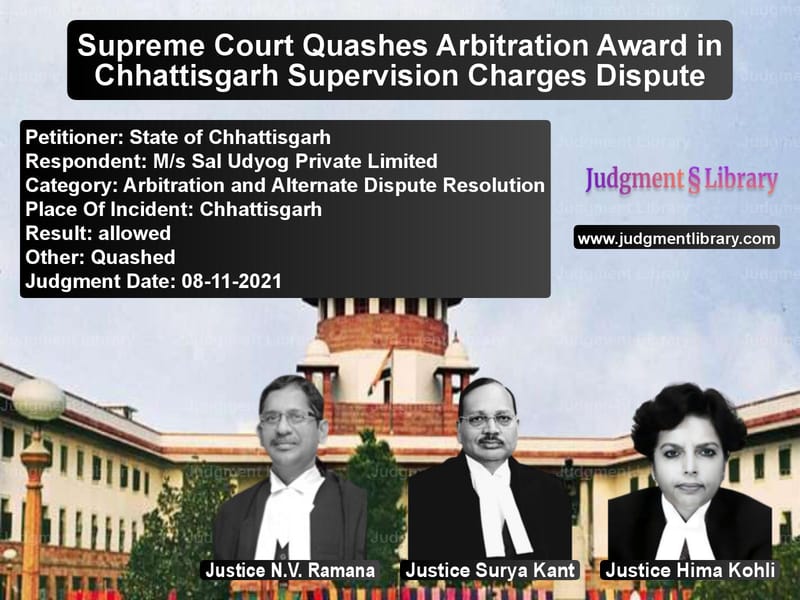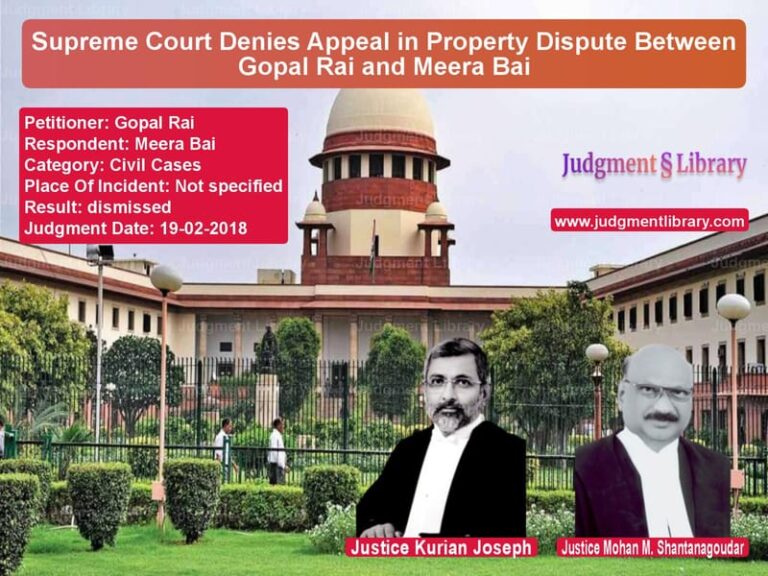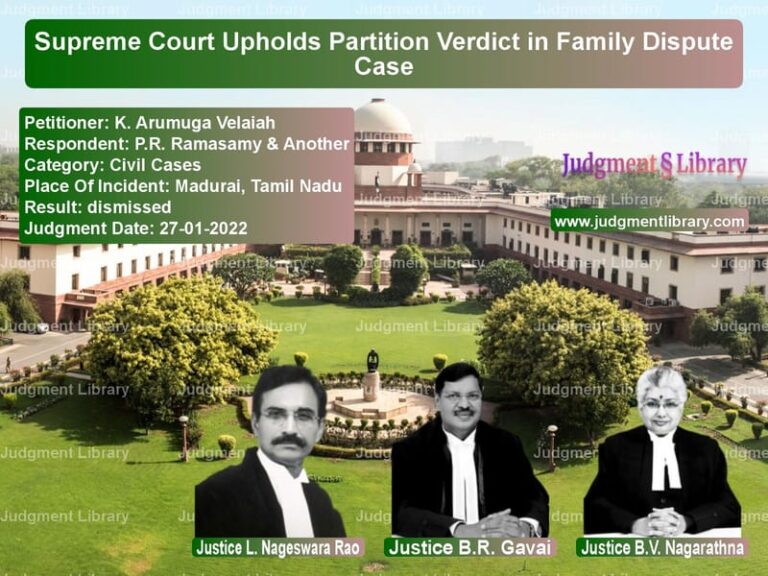Supreme Court Quashes Arbitration Award in Chhattisgarh Supervision Charges Dispute
The Supreme Court of India recently ruled on an important arbitration dispute between the State of Chhattisgarh and M/s Sal Udyog Private Limited. The case revolved around whether supervision charges levied by the state for the collection and supply of Sal seeds were legally valid. The arbitrator had ruled in favor of the respondent, leading to an appeal before the High Court, which partially upheld the award. However, the Supreme Court found a ‘patent illegality’ in the award, overturning it and ruling in favor of the state.
Background of the Case
The dispute arose from an agreement signed on August 30, 1979, between the State of Madhya Pradesh (now Chhattisgarh) and M/s Sal Udyog Private Limited for the supply of 10,000 tonnes of Sal seeds annually over 12 years. The agreement allowed the state to recover expenses, including supervision charges.
In 1987, the Madhya Pradesh government enacted legislation to annul all agreements related to forest produce, but this law was only notified in 1997. During this period, the agreement was renewed in 1992 and was set to expire in April 2004. However, in December 1998, the state government terminated the agreement citing the new legislation. Sal Udyog initiated arbitration proceedings on December 6, 1999, claiming a refund of excess supervision charges paid over the years.
Claims and Counterclaims
Arguments by the Petitioner (State of Chhattisgarh)
The state argued that:
- The agreement explicitly included supervision charges under Clause 6(b).
- A government circular issued on July 27, 1987, fixed supervision charges at 10% of the price.
- Sal Udyog had paid these charges without protest for nearly two decades.
- The arbitrator’s decision to exclude supervision charges was against the contract terms and constituted a ‘patent illegality.’
Arguments by the Respondent (Sal Udyog Private Limited)
Sal Udyog argued that:
- The supervision charges were unjustified and were levied without clear justification.
- The arbitration tribunal had properly assessed the claims and ruled in favor of the company.
- The State had not raised the issue of supervision charges specifically in lower court proceedings and could not introduce new arguments at the Supreme Court stage.
- The award should not be overturned simply because the state was unhappy with the arbitrator’s decision.
Analysis of the Arbitration Award
The arbitration tribunal ruled in favor of Sal Udyog, awarding the company Rs. 7.43 crore, including interest. The tribunal justified its ruling by stating that:
- The state had failed to justify the calculation of supervision charges beyond general administrative expenses.
- The company had the right to seek a refund for charges that were not explicitly mentioned in the agreement.
- Since the state had terminated the agreement unilaterally, it could not claim additional amounts under the supervision charge clause.
The State of Chhattisgarh challenged this award under Section 34 of the Arbitration and Conciliation Act, 1996, before the District Judge in Raipur, who upheld the arbitration ruling except for modifying the interest rate. The state then appealed to the High Court, which also upheld the award.
Read also: https://judgmentlibrary.com/arbitration-ruling-no-pendente-lite-interest-when-contractually-barred/
Supreme Court’s Judgment
The Supreme Court analyzed the agreement terms and relevant government notifications. It noted:
“The failure of the arbitrator to apply the binding terms of the contract constitutes a patent illegality on the face of the award.”
Key observations of the Supreme Court included:
- The agreement and government circular clearly permitted the levy of supervision charges.
- The arbitrator could not ignore explicit contractual terms, which were binding on both parties.
- The respondent had paid supervision charges without protest for over two decades, indicating acceptance of these charges.
- The arbitrator’s decision to exclude these charges amounted to rewriting the contract, which is beyond the scope of arbitration.
Legal Precedents Considered
The Supreme Court relied on various precedents, including:
- Associate Builders v. Delhi Development Authority (2015) 3 SCC 49 – Clarified that an arbitrator must follow the contract terms and not overstep jurisdiction.
- Ssangyong Engineering v. NHAI (2019) 15 SCC 131 – Defined ‘patent illegality’ as an error that strikes at the root of the matter.
- Delhi Airport Metro Express v. DMRC (2021 SCC Online SC 695) – Reiterated that courts can intervene in arbitration awards if a fundamental contractual term is ignored.
Final Decision
The Supreme Court quashed the arbitration award as far as it directed the refund of supervision charges. The judgment stated:
“The Arbitral Tribunal failed to consider the binding nature of Clause 6(b) and the July 1987 government circular. The decision to ignore supervision charges is a fundamental error and warrants interference.”
Impact of the Judgment
The ruling reinforces the principle that arbitrators must adhere strictly to contract terms. The decision prevents entities from using arbitration to rewrite contracts and underscores the importance of legal consistency in government agreements.
Conclusion
The Supreme Court’s judgment highlights the boundaries of arbitration, emphasizing that an arbitral tribunal cannot override express contract terms. By quashing the award, the Court has reaffirmed that arbitration decisions must align with legal and contractual obligations, preventing undue financial burdens on state entities.
Petitioner Name: State of Chhattisgarh.Respondent Name: M/s Sal Udyog Private Limited.Judgment By: Justice N.V. Ramana, Justice Surya Kant, Justice Hima Kohli.Place Of Incident: Chhattisgarh.Judgment Date: 08-11-2021.
Don’t miss out on the full details! Download the complete judgment in PDF format below and gain valuable insights instantly!
Download Judgment: state-of-chhattisgar-vs-ms-sal-udyog-privat-supreme-court-of-india-judgment-dated-08-11-2021.pdf
Directly Download Judgment: Directly download this Judgment
See all petitions in Arbitration Awards
See all petitions in Dispute Resolution Mechanisms
See all petitions in Enforcement of Awards
See all petitions in Judgment by N.V. Ramana
See all petitions in Judgment by Surya Kant
See all petitions in Judgment by Hima Kohli
See all petitions in allowed
See all petitions in Quashed
See all petitions in supreme court of India judgments November 2021
See all petitions in 2021 judgments
See all posts in Arbitration and Alternate Dispute Resolution Category
See all allowed petitions in Arbitration and Alternate Dispute Resolution Category
See all Dismissed petitions in Arbitration and Alternate Dispute Resolution Category
See all partially allowed petitions in Arbitration and Alternate Dispute Resolution Category







